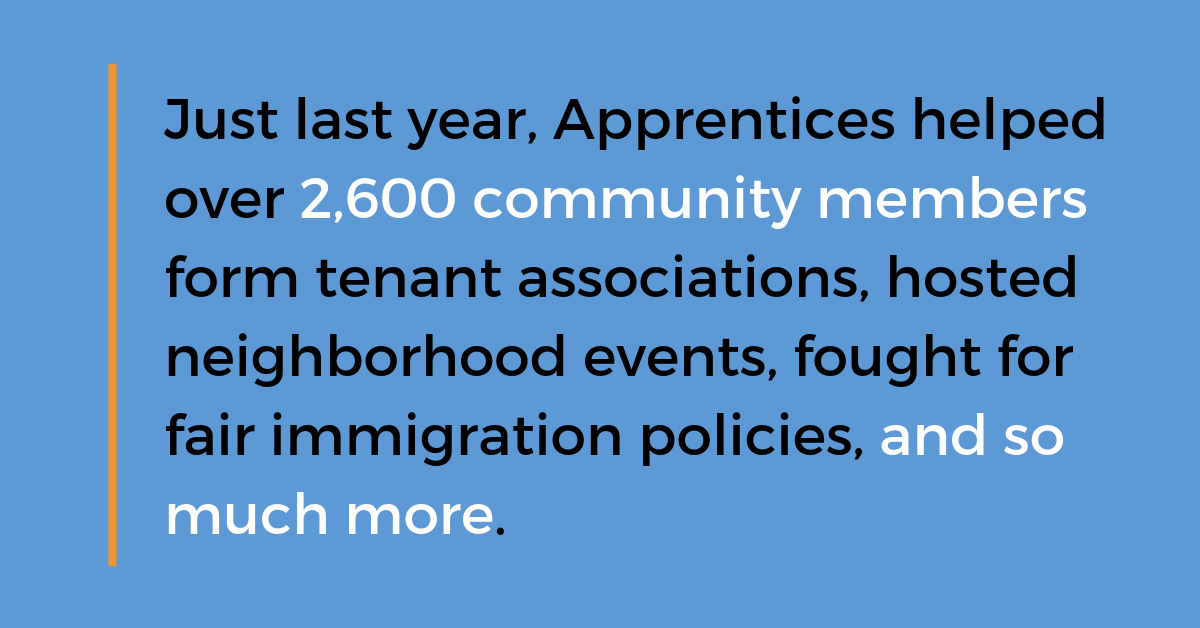
The ANHD Blog raises the profile of our issues, and educates our member groups, city decision makers, and the general public on our core issue areas. The ANHD Blog offers sharp, timely and effective commentary on key public policy issues, as well as our work and the work of our member groups.
All of our blogs are sorted based on the issues, projects, special tags, and dates they are associated with, and you can use the dropdowns below to filter through our blogs based on these tags. Additionally, you can do a general search through our blog, using the search bar the right. If you can’t find what you are looking for, email comms@anhd.org.
Six Lessons for Cultivating Leadership of Color in the Community Organizing Movement
Non-profit organizing institutions have long struggled with the fact that their leadership is disproportionately white and middle class. We all know that our organizing will ultimately be more effective and more grounded in a true commitment to justice, if the primary actors are directly impacted people, those who come from the marginalized communities in which we work.
Cultivating movement leadership of color must include an effective approach for recognizing, attracting, and training new community organizers of color, then supporting them as they hone their skills to more advanced levels. But even here – or maybe, especially here – our movement falls short; we have seen that it is consistently difficult for people from marginalized communities to overcome the barriers to both entry and advancement in community organizing. Consequently, people of color and other marginalized people are grossly underrepresented in leadership positions. There are many reasons for this, including implicit bias and the glorification of mainstream career and educational backgrounds, both of which hinder the recognition of candidates from marginalized backgrounds. Consequently, our organizations often ignore or undervalue the critically important skills and experiences that directly-impacted leaders can bring to movement organizations.
One important step is to have community organizing training programs with rigorous approaches to skills-building and intentional strategies for training, supporting, and promoting leaders of color. ANHD’s Center for Neighborhood Leadership (CNL) Apprenticeship Program helps make organizing a viable life and career option for directly impacted people by providing new organizers with ten months of intensive support, high quality training, on the ground experience, and access to critical resources. Since the program was founded ten years ago, 91 individuals have graduated from the Apprenticeship Program with 86% of those Apprentices finding full-time employment in the movement after graduation, and many later becoming lead organizers or directors of organizing departments.
Through the years, CNL has seen the transformative impact these ten apprentice-training months can have on new organizers, and we have paid close attention to what makes an effective support model for developing indigenous community leadership. CNL’s experience directly challenges the notion that communities of color, poor, immigrant, and other marginalized communities need external actors to organize them.
Here Are Six Lessons We Have Learned:

Oppressive systems teach people to be small, attempting to strip us of our voice and power while simultaneously obscuring the contributions of marginalized people. As a result, people – and more specifically those in the community development movement – too rarely look at a directly impacted person from a marginalized community and think, “Now, there’s a leader!” More importantly, despite having tremendous talent, people from marginalized communities may not look at themselvesand recognize a leader. The CNL program invests a considerable amount of time to help Apprentices explore, identify, reclaim, and cultivate their leadership while developing the skills to help others in their community do the same. Having a 10-month long program allows us to dig in deep, creating time for exploration and personal growth. Sometimes, people recognize and assert their leadership early in the program, and sometimes it takes the whole ten months for people to feel comfortable stepping forward. But for most people, the length of the program allows it to be intense, challenging, and ultimately, transformative.

Comprehensive and applicable course content is essential for a successful organizing training program. As experienced organizers, CNL staff know what it takes to win campaigns, build power, and strengthen institutions, as well as how to hire and supervise organizers. All of CNL’s trainers have real on-the-ground organizing experience as well as deep knowledge of diverse approaches to community organizing within marginalized communities. CNL also recognizes that everyone learns differently, so trainers utilize a broad array of training modalities to accommodate different learning styles. And, we constantly review and refine the curriculum to meet evolving Apprentice needs.

Communities of color are under near constant attack, so we recognize that we don’t all have the luxury of thinking exclusively about theory. However, we also know that a coherent organizing model is essential for effective organizing work. At CNL, we marry organizing theories with the messy work of real life organizing, rather than teaching one neat and static theory. The CNL Apprenticeship Program teaches organizing concepts in a way that is grounded in actual organizing work. For four days a week, Apprentices are out doing organizing work at a host organization alongside an experienced organizer. They spend one day per week in training so they can test the approaches they’re learning in practice, and then have the space to step back and think through the day-to-day challenges of organizing work. CNL intentionally avoids having a dogmatic approach; instead we help participants learn to innovate and tailor their work to meet the needs of their communities. Because our participants live the struggle every day, they constantly push training staff to think more broadly and examine our own assumptions and orthodoxies.

Leadership is often thought of as a special trait possessed by a small and exclusive set of people. At CNL, we see leadership more broadly and take chances with non-traditional leaders who may not present as expected. We look at the whole person, not just their resume and what degrees they attained or didn’t attain. We also don’t just check demographic boxes or look for the loudest person in the room. The ideal CNL Apprentice is of course passionate and committed, but they are also interested in learning collective models of social change and have a concept of justice that extends beyond their own immediate self-interest.

When we look at New York City organizations, including social justice organizations, people of color and other marginalized groups are under-represented in senior positions. Consequently, new people of color, queer, immigrant, and women organizers are challenged by an inadequate supply of mentors and role models who share their experiences and identities. At CNL, the staff, training materials, and guest speakers all reflect diverse backgrounds, creating an environment where the program participants can see their identities reflected in positions of leadership and expertise.

Organizers from marginalized communities are too often responsible for high levels of emotional labor and carry a double burden of living with oppression while simultaneously fighting it. Organizing work is usually under-appreciated and under-paid. Organizing work can also be surprisingly isolating; by utilizing a cohort model, the CNL Apprenticeship is able to build a tight-knit, supportive community that helps Apprentices navigate the common challenges for new organizers. During the ten months of the program, Apprentices build authentic relationships with each other and with CNL staff. Apprentices are cared for as individuals, in a community bound together by ties of affection, respect, and trust. In the CNL space, Apprentices always have people who will challenge, frustrate, and support them.
 Each program year, we see that the CNL model works. In the last graduating class, 35% of graduates from CNL’s Organizing Apprenticeship Program were hired by their host sites and 71% remain in the field of community organizing. CNL Apprentices have contributed to multiple important local and city-wide campaigns. Just last year, Apprentices helped over 2,600 community members form tenant associations, hosted neighborhood events, fought for fair immigration policies, and so much more.
Each program year, we see that the CNL model works. In the last graduating class, 35% of graduates from CNL’s Organizing Apprenticeship Program were hired by their host sites and 71% remain in the field of community organizing. CNL Apprentices have contributed to multiple important local and city-wide campaigns. Just last year, Apprentices helped over 2,600 community members form tenant associations, hosted neighborhood events, fought for fair immigration policies, and so much more.
The Apprentices are, individually and collectively, an inspiration to us; the intelligence, compassion, and drive they bring to the work has made the social justice world in New York City stronger, more vibrant, and more durable. Cultivating leaders of color in the community organizing movement matters, and it’s worth getting it right.
In addition to the Apprenticeship, CNL also supports and trains currently employed community organizers at varied career stages through the CNL Organizing Academy and provides strategic technical assistance to organizations to help them build or reinforce their organizing through the Community Impact Project. To learn more about our programs and our impact, visit www.cnlnyc.org.

